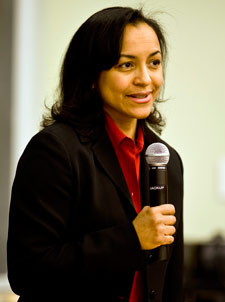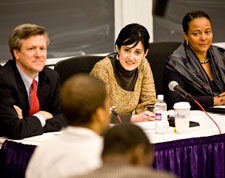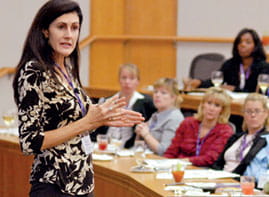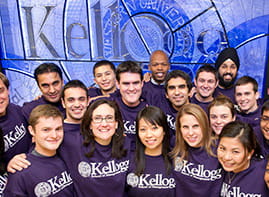11/12/2008 - President-elect Barack Obama’s successful campaign strategy — including the use of targeted messaging and online tools to raise millions of dollars — could be considered the “love child” of former White House Deputy Chief of Staff Karl Rove and Democratic National Committee Chairman Howard Dean.
 |
| Angela Edwards-Campbell, director of diversity and inclusion at the Kellogg School, said the intent of these discussions is to provoke conversation about diversity and its impact on business. The event was sponsored by the Kellogg School’s Office of Diversity and Inclusion. |
| Photo © Chris Guillen |
 |
| Panelists and students discussed the impact of the U.S. Presidential election during a Nov. 10 Kellogg event. Participants included, from left, Paul Christensen, senior finance lecturer and associate director of the Kellogg International Business and Markets Program; Victoria DeFrancesco Soto, Northwestern professor of political science and African-American studies; and Cheryl Mayberry McKissack ’89, CEO of Nia Enterprises. |
| Photo © Chris Guillen |
That’s the conclusion of Victoria DeFrancesco Soto, Northwestern University assistant professor of political science and African-American studies and a faculty fellow for the Institute for Policy Research, who elicited laughs from the Kellogg School audience Nov. 10 during a post-election forum and panel discussion.
The event was sponsored by the Kellogg School’s Office of Diversity and Inclusion and the student Diversity and Inclusion Council. Panelists discussed how the presidential election has changed the campaigning landscape and how Obama’s inclusive, integrated marketing approach to campaigning helped pave the way for his success.
“We’ve entered a new age of campaigns,” Soto told the audience, which included students, faculty and staff. “We’ve seen a convergence of political and consumer marketing campaigns.”
Soto said that the Obama campaign used tactics that were successful in campaigns run by both Dean and Rove: the former used the Internet to solicit small donations when he was running for president in 2004, while the latter Rove deployed a segmented marketing strategy to cater to key demographic groups, such as the so-called “soccer moms,” when he ran the presidential campaigns for President George W. Bush.
“There is a lot more synergy between consumer marketing and political science,” Soto said. “That was not the case with campaigns 50 years ago.”
Cheryl Mayberry McKissack ’89, chief executive of Nia Enterprises and a lecturer of entrepreneurship and innovation at the Kellogg School, said that Obama’s campaign tapped the Internet’s power to deliver personalized e-mail and text messages to donors. Sen. John McCain, however, “totally missed it” in terms of taking advantage of the technology, she said.
“You know the e-mails aren’t sent to you directly by him [Obama] or Michelle or his campaign manager, but you felt connected, even when you are just giving $5 to the campaign,” McKissack said.
Paul Christensen, senior lecturer of finance and associate director of the Kellogg International Business and Markets Program, said Obama’s win stirred enthusiasm in world leaders. As evidence, he citied the many congratulatory messages that leaders sent the president-elect after his victory.
“Obama symbolizes diversity and that allows him to relate to people around the world,” Christensen said. “Governments are drawn to his youth and energy. He represents a new chapter of diplomacy.”
However, Christensen said that international business leaders are cautious of the president-elect, taking a “wait-and-see approach” with how Obama will deal with the current economic crisis. International trade, taxes and immigration policy are the issues that business leaders will be watching closely as Obama takes office, Christensen said.
After panelists spoke, moderator Doug Harris, president of The Kaleidoscope Group, divided audience members into small groups to discuss what stood out in the election and solicited their thoughts on the election’s implications for business and society.
“Whether you’re looking at the politics, marketing or quality of leadership,” said Angela Edwards-Campbell, director of diversity and inclusion at the Kellogg School, “the 2008 election shows the power of an inclusive approach to achieve sweeping results.”






